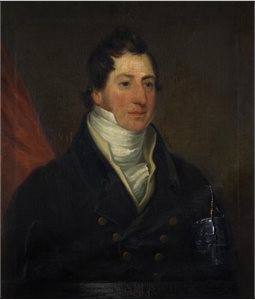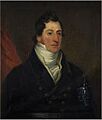John Tennant (Irish Legion) facts for kids
Quick facts for kids
John Tennant
|
|
|---|---|

"John Tennent" around 1810
|
|
| Born | 18 August 1777 Roseyards, County Antrim, Kingdom of Ireland |
| Died | 18 August 1813 (aged 36) Goldberg, Silesia, Kingdom of Prussia |
| Buried |
near Goldberg, Silesia
|
| Allegiance | |
| Years of service | 1799 and 1803-1813 |
| Rank | Chef de bataillon |
| Unit | Irish Legion |
| Battles/wars | Anglo-Russian invasion of Holland 1799 German Campaign of 1813 |
| Awards | Légion d'honneur |
| Relations | William Tennant, Robert Tennent |
John Tennant (1777–1813) was an Irish soldier and a strong supporter of the Society of the United Irishmen. This group wanted Ireland to be independent and have more rights for all its people. John Tennant left Ireland in 1797 to avoid being arrested and to seek help from France.
After a rebellion in Ireland failed in 1798, he joined the French army under Napoleon. He fought bravely in a special unit called the Irish Legion. John Tennant died in battle in Silesia in August 1813.
Contents
Early Life and Beliefs
John Tennant was born in 1777 in Roseyards, near Ballymoney, in County Antrim, Ireland. He was one of eight children. His father was a Presbyterian minister who believed in fairness for everyone. This was important because, at the time, certain groups had more power and influence in Ireland.
When John was 14, he started working for a grocer. He didn't enjoy this job. Later, he moved to Belfast. There, his older brother William introduced him to important members of the United Irishmen, including Theobald Wolfe Tone.
John strongly believed in freedom and independence for Ireland. He decided to join the United Irishmen in 1793. He was especially upset after seeing soldiers attack people and businesses linked to the movement for more rights.
Joining the United Irishmen
In 1796, the French tried to invade Ireland, which worried the British authorities. They started taking strong actions to stop the United Irishmen. Many leaders, including John's brother William, were arrested.
John Tennant and two other Irish delegates, Alexander Lowry and Bartholomew Teeling, went to Dublin. They urged the United Irishmen leaders to accept an offer from some soldiers to take over Dublin Castle. When this plan was rejected, they decided to leave Ireland. They hoped to get help from France.
John Tennant and Lowry traveled to Texel in August 1797. There, they met Wolfe Tone on a Dutch fleet preparing for an invasion. However, the invasion was not aimed at Ireland. They told Tone that the revolutionary spirit in Ireland was fading. Many people were losing hope because the French had not arrived earlier.
In October, the British navy won a big battle at Camperdown. This ended any hope of a French-Dutch attack on Ireland. Tennant and Lowry then went with Tone to Paris. In December, they even met Napoleon. For unknown reasons, Tennant did not go with Tone on his final, unsuccessful trip to Ireland in 1798.
Fighting with the Irish Legion
In 1799, John Tennant joined the French army. He served as a chef de bataillon, which is like a commander of a military unit. His group helped push the British and Russian armies out of Holland. After this, he returned to civilian life for a short time in Paris.
In 1803, Napoleon created a special unit called the "Irish Legion." It was made up entirely of Irishmen or their descendants. Tennant was made a captain in this Legion in December 1803.
In 1804, Napoleon became Emperor. Each army regiment sent two representatives to his coronation. John Tennant and William Corbet were chosen to represent the Irish Legion. They received a special flag, called an Eagle, from Napoleon himself. This was a great honor.
The Legion was first based in Brittany, France. It mostly had officers at first. In 1806, it moved to Mayence and became a full military unit. Many Polish and Irish prisoners of war joined the French army. The Legion then moved to the island of Walcheren, where many soldiers got sick with malaria.
In 1809, the Irish Legion was renamed the 3rd Foreign Regiment. John Tennant was promoted to chef de bataillon and became the commander of a new battalion. He missed a major English landing because he was forming this new unit.
In 1811, his battalion was combined with another, and he took overall command. Luckily, the Irish Regiment stayed in Holland during Napoleon's difficult Russian Campaign of 1812. However, they were stationed in low-lying, malaria-prone areas.
In early 1813, the Irish Regiment was reorganized into two strong battalions. John Tennant commanded the 1st Battalion. They marched to Magdeberg and then fought bravely at the Battle of Bautzen in May. They also fought with distinction at the Battle of Haynau under Napoleon's direct command. As a reward, they were given the honor of guarding the town of Lignitz for Napoleon.
A Soldier's End
On August 16, 1813, John Tennant's division was gathered at Goldberg in Silesia. Two days later, on August 18, enemy cavalry attacked. The regiment formed squares to defend themselves. They held their ground, but the enemy then brought out cannons.
The Irish Regiment became easy targets for cannon fire. They lost many men. John Tennant was giving orders to close the ranks when he was hit by a cannonball. He died instantly. His soldiers buried him with their bayonets.
Only a few of Tennant's comrades survived the fighting that followed. Just eight Irish Legionnaires escaped a final stand at Löwenberg on August 29, carrying their regimental Eagle with them.
His Brothers in Belfast
On the same day John Tennant was killed, his brother Robert Tennent was arrested in Belfast. Robert was a doctor and was taken to jail after a public meeting. He had been speaking out about a violent incident in the town.
John Tennant's eldest brother, William Tennant, also survived him. After being released from prison in 1802, William became a successful merchant banker. Both William and Robert supported many good causes. They helped found the Belfast Academical Institution, a well-known school, along with other former United Irishmen.
Images for kids


